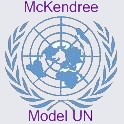BY BRYAN GROSS

For most of us here at McKendree the time of year when Model U.N. rolls around is nothing more than a time in which we should all run for the scant comfort of the 1828 café while Ames becomes infested with high school students. We stand up in class and let each other know when that dreaded day is coming, and we ask around to find out if we have not been informed.
This paints a pretty clear picture of what the general mood of the campus is towards this event, but I have to ask how many people have actually experienced the event itself? Do you really even know what it entails?
This semester, I decided to join the ranks of many Model U.N. members. I attended a few training meetings to get the groundwork down for what I would be doing and how to conduct myself over the three days it was in session . When the week rolled around, I put on my best suit. On the first day, I was very nervous about my position, as I was assigned to be a co-chair, which meant that I was an assistant to the chair of the committee.
The chair’s job isto run the committee for the high school students. If anyone has ever played a role-playing game, then the structure of this event will be familiar to you. The chair acts as the GM (Game Master) who establishes the boundaries of the activity and attempts to keep everyone involved working within those boundaries. While at my committee, I watched high school students participate in a massive role-playing event even if they did not think of it that way. My first day at the committee went off without much of a hitch and the three hours I was there were very interesting. I saw an environment where students were allowed to explore higher level concepts than they had learned in school while interacting in a way that promoted public speaking and the ability to sway another to your way of thinking.
The second day of the event was when my six hour committee took place. I was co-chair to Quinn McRoberts. We arrived to our committee at 9 a.m. and set everything up. From there, we handled the committee much as we did the day before, but at around the 11:00 o’clock mark, something began to happen. Model U.N.’s process for going through resolutions allows amendments to be added in order to let delegates change it to their liking. There are two kinds of amendments: friendly amendments and unfriendly amendments. A friendly amendment only needs ten signatures from different nations, and the author of the resolution to consent, before being put into effect. An unfriendly amendment is created without the author of the resolutions consent, and can only be put into effect with a majority vote.
The resolution we were working on had several friendly resolutions that the room had generally agreed with, but had been drafted and signed by a relatively small group of people. One of the delegates suggested an unfriendly amendment that was hotly debated by the group who had been drafting the friendly resolutions. The unfriendly amendment passed by a large majority, and here is where the story gets interesting. Those same ten people drafted up a friendly amendment that struck the previous unfriendly amendment.
After some stern words from Quinn, they decided that perhaps it would not be a good idea to so blatantly disrespect the majority. This caused a larger problem though. Those who had previously led the discussion had now been cast as the enemies of democracy (or so the other delegates thought), and believed that they should dismantle the resolution they had been working on. This resulted in a rather hostile environment in the room, but Quinn managed to control the room with some well-timed jokes and rationale thinking. After that, the delegates learned to cut more people into the decision making process, and not to hold grudges after the fact.
With my experience at the conference drawing to a close, I decided to interview Amanda Walker, the current Secretary General. After speaking with her, I found out that Model U.N. has been running for 43 years on McKendree University’s campus. When asked what she would say to a prospective member, she said that the activity itself was “low work high reward”.
In my time at McKendree, I had considered Model U.N. to be a biannual annoyance at best. When I peeled back the surface though I found something quite different from what I had expected. There is an old phrase we should all know that describes what I experienced those three days rather well: “Don’t Judge a book by its Cover”.